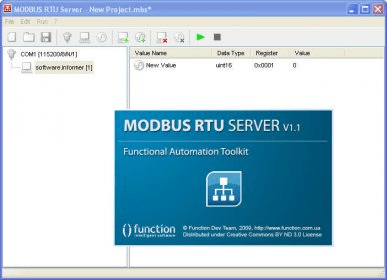

- #Modbus server simulator serial#
- #Modbus server simulator update#
- #Modbus server simulator driver#
- #Modbus server simulator software#
- #Modbus server simulator code#
Using a USB to Serial converter the maximum bytes you can send is NO OF REGISTERS, NO OF BYTES and two BYTES CRC the master can only write Slave and since a 9 bytes is already used for ID, FUNCTION, ADDRESS, In a function 16 request the master will attempt to write to your Slave and since 5 bytes is already used for ID, FUNCTION, NO OF BYTESĪnd two BYTES CRC the master can only request 58 bytes or 29 registers. In a function 3 request the master will attempt to read from your Most of the time you will connect the arduino to a master via serial The Arduino serial ring buffer is 64 bytes or 32 registers. The modbus_update() method updates the holdingRegs register array and checks The master will use this value to alter the brightness of its In addition to this the slaves own adc ch0 value will be stored inĪddress 0 in its own address space holdingRegs for the master toīe read. The value received from the master will be stored in address 1 in its own It will then use this value to adjust the brightness of the led on pin 9.
#Modbus server simulator code#
This example code will receive the adc ch0 value from the arduino master. SimpleModbusSlaveV10_DUE supports function 3, 6 & 16. If (currentMillis - previousMillis >= interval)
#Modbus server simulator update#
Regs = analogRead(0) // update data to be written to arduino slaveĪnalogWrite(LED, regs>2) // constrain adc value from the arduino slave to 255 Modbus_configure(&Serial, baud, timeout, polling, retry_count, T圎nablePin, packets, TOTAL_NO_OF_PACKETS, regs) Initialize the Modbus Finite State Machine modbus_construct(&packets, 1, FORCE_SINGLE_COIL, 5, 1, 1) modbus_construct(&packets, 1, READ_INPUT_STATUS, 0, 1, 0) Modbus_construct(&packets, 1, PRESET_MULTIPLE_REGISTERS, 1, 1, 0) Modbus_construct(&packets, 1, READ_HOLDING_REGISTERS, 0, 1, 0) Create an array of Packets to be configured TOTAL_NO_OF_PACKETS // leave this last entry This is the easiest way to create new packets The total amount of available memory on the master to store data
#Modbus server simulator driver#
used to toggle the receive/transmit pin on the driver On the arduino slave (id=1) adjusting the brightness of an led on pin 9 using PWM. It will then use packet2 to write a register (its own adc ch0 value) to address 1 It will then use this value to adjust the brightness The example will use packet1 to read a register from address 0 (the adc ch0 value)įrom the arduino slave (id=1). initialize the library with the numbers of the interface pins I am using following master and slave programs. I tried on this topic from few days, following are the things which I manage to run the circuit with program on proteus properly with no fail attempts.
#Modbus server simulator software#
I am using arduino UNO pair for aster and slave.įor software simulator I am using simply modbus slave and master v8.0Ĭommunication with computer through RS485 protocol. I want to make modbus master and slave, which will work with each other or with simulating software with function 3,6,16. Please contact us for further information.I am trying to make project on modbus protocol, I read almost all forums and posted my querry over there, but I didn’t got answer so I am opening new topic. Support for Modbus RTU is provided by external gateways. Modbus TCP multi-node I/O module that simulates up to 32 servers Modbus TCP I/O module that acts as one server Modbus TCP I/O module that acts as one client IO75x I/O modules do not require run-time licenses. This solution ensures deterministic transmission of client queries and short response times to queries in the server because the protocol stack runs on the I/O module. One module acts either as a single Modbus TCP node or a whole network of Modbus nodes. The IO75x I/O module series provides dedicated Modbus TCP I/O modules for single-node and multi-node applications. Performance, Mobile and Baseline real-time target machinesīaseline and Unit real-time target machines In addition to onboard Ethernet support, native Modbus TCP is compatible with the following Ethernet I/O modules: Product Performance, Mobile, Baseline, and Unit real-time target machines The following native implementations are available: Product

Native Modbus TCP support is available with MATLAB R2020b and later. Each Modbus node requires a run-time license. One Ethernet port can handle the data transmission of multiple Modbus nodes configured in the real-time application (client, server, or both). This is supported with onboard Ethernet interfaces and plug-in Ethernet I/O modules.


 0 kommentar(er)
0 kommentar(er)
